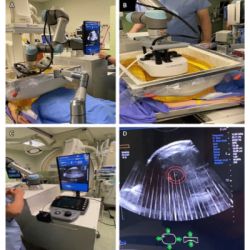Results of a small study from the Children's Hospital of Philadelphia (CHOP) suggest that functional magnetic resonance imaging (MRI) may give physicians additional diagnostic information about fetal heart problems. This amount of data is not currently available with fetal ultrasound exams.
"Fetal MRI can both improve the quality of cardiac images as well as provide diagnostic information that had been unavailable previously," says principal investigator Mark A. Fogel, M.D., director of cardiac MRI at CHOP (Philadelphia, Pennsylvania) and associate professor of pediatrics at the University of Pennsylvania School of Medicine. Fetal MRI improves image quality by providing substantially better tissue contrast than is possible with fetal ultrasound, and MRI enables clinicians to acquire three-dimensional fetal images routinely, says Fogel.
New possibilities
Fogel and colleagues conducted the first evaluation of functional MRI for cardiac imaging in fetuses. Preliminary findings related to the first two fetuses tested (one fetus had hypoplastic left-heart syndrome, while the other had ductal constriction) were published in the journal Fetal Diagnosis and Therapy (2005 Sep-Oct;20[5]:475-80). The investigators found that real-time, functional fetal cardiac MRI allowed them to quantitatively assess ventricular volumes and cardiac output in utero.
Performing fetal cardiac MRI effectively requires an advanced MRI system. "You need strong magnets with large gradients to capture clear images because the fetal heart is moving," says Fogel. In their research, Fogel and colleagues used a 1.5-tesla Siemens Magnetom Sonata system.
To avoid potential risks, "we don't inject gadolinium [as a contrast agent] during fetal cardiac MRI because of the unknown safety profile in this population," says Fogel. Furthermore, although MRI is not associated with the radiation exposure linked to computed tomography, the potential for overexposure to radio-frequency energy during MRI remains a concern. "With each MRI exam, you are delivering magnetic energy to the fetus," says Fogel. "So, we want to exercise caution in this area and therefore take measures to try to limit the fetus's exposure to radio-frequency energy," he says.
"Prior to our study, you really could not measure ventricular volumes with fetal ultrasound. Instead, the physician would have to make assumptions about ventricular volume," Fogel told Health Technology Trends. "Fetal MRI actually lets you calculate ventricular volume, and it has the potential to allow velocity mapping"-in which physicians can determine both the quantity and the velocity of blood flow, Fogel says. Currently, physicians can use fetal ultrasound to measure the velocity of cardiac circulation, "but you still need to make assumptions about flow quantity," he explains.
Accuracy in estimating ventricular volumes is only possible if the heart has a normal shape. "Many heart diseases involve abnormal shapes, and accurately measuring ventricular volume in such cases is important in assessing how well the heart is working and in guiding physicians to the most appropriate treatment," says Fogel.
Fogel believes that MRI may offer additional benefits when evaluating fetal heart conditions. "With the new information available through fetal MRI, we can now perform noninvasive tagging that will let us label myocardial tissue without the need for invasive procedures," he states. Furthermore, MRI offers a comparatively wide field of view. "MRI lets us view a lot more of the patient in the images to give us a more complete perspective of the fetus, whereas ultrasound has a much smaller [image] window and doesn't let us see through bone," adds Fogel.
The quality of diagnostic information from MRI also tends to be more uniform across cases and less dependent on the skill of the clinician conducting the exam. "Each patient is different, and you need to be able to change the technical parameters [of the imaging exam] for each individual, but once you input the sequence of instructions into the system's computer, MRI is less operator dependent than ultrasound," says Fogel.






















